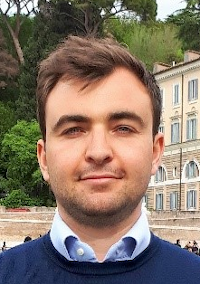Plenary Speakers:

Title: Manufacturing Scheduling: Old Solutions for New Problems?
Abstract: In the last years, a series of disruptive changes in the manufacturing process/technologies (additive manufacturing, IoT, CPS … to name a few) and in the demand/customers drivers (servitization, circular economy, …) are shaping new manufacturing scenarios which may be substantially different than those currently in place. As a consequence, the manner in which scheduling decisions have to be carried out may be heavily impacted. In this talk, we will discuss whether these changes may be addressed by simply extending the existing scheduling theory by e.g. devising new scheduling models and/or new solution procedures, or whether they require a profound rethinking of the field by incorporating new approaches. In this regard, illustrative examples will be presented and some tentative conclusions will be drawn.
Jose M Framinan is Professor at the School of Engineering in the University of Seville, Spain, where he is currently the Head of the Industrial Management Research Group. His research interests refer to decision systems and models in industry and services, including a range of decisions related to the design and optimization of processes, production and supply chain planning and scheduling, as well as information systems as a supporting infrastructure. In these areas, has published over 100 papers in international refereed journals, and carried out a number of several research projects and industry grants. He serves as editor in chief of the European Journal of Industrial Engineering, and Area Editor of the editorial board of the Flexible Services and Manufacturing Journal.

Title Perspectives and trends of Industry 4.0 in Latin America
Abstract: In recent years, the advent of Industry 4.0 technologies has changed the world. Industry 4.0 is clearly not a buzzword or trend; Industry 4.0 and its successors (Industry 4.1? 5.0?, 4.01?) are here to stay. Despite its popularity, there is no agreement on what it exactly is and how it can be implemented; as of today, nobody can simply go shopping for Industry 4.0. Moreover, the adoption pace of such technologies has been dissimilar. Although no society in the world has disregarded the impact of this digital transformation, emerging economies sometimes struggle to “jump on the bandwagon”. This comes at no surprise due to shortage of connectivity, infrastructure and… maturity. However, something needs to be done. This talk first introduces the current topics and technologies then addresses new trends and perspectives of Industry 4.0 in Latin America with special focus on production systems, urban transportation, and supply chain. The talk also examines potential areas of application and new research topics specific for the Americas region.
Gonzalo Mejía received BS and MSc mechanical engineering degrees from Universidad de Los Andes in Colombia and a Ph.D. degree in industrial engineering from Lehigh University, Bethlehem, PA, USA.
He is currently an Associate Professor with the Faculty of Engineering in Universidad de La Sabana (Colombia). He is the president of the Americas region of the International Foundation of Production Research (IFPR), and Board Member of ASOCIO (Asociación Colombiana de Investigación de Operaciones). His research interests include production systems, scheduling and logistics of perishable foods. He has led and participated in several government funded projects and formulation of public policies. He has also published numerous research papers in leading journals.

Title: Managing Macro Level Supply Chain Disruptions: Lessons from COVID-19
Abstract: This talk discusses supply chain strategies and practices that have contributed to the disruptions we are currently facing amid COVID-19. We present both short-term and long-term strategies that companies can utilize to mitigate the impact of such a disruption in future. We also highlight the importance of strengthening the nexus between academic research and practice in designing and operating robust and resilient supply chains.
Sri Talluri is currently the Hoagland Metzler Endowed Professor and a Professor of supply chain management at Michigan State University, East Lansing, MI, USA. His research interests are in the areas of supply risk, buyer-supplier relationships, sustainability in supply chains, performance evaluation, and technology management. His methodological expertise includes deterministic and stochastic modeling, game theory, empirical methods, and data envelopment analysis.
He has authored or coauthored more than 90 articles in journals, such as IIE Transactions, Journal of Operations Management, Decision Sciences, Production and Operations Management Journal, International Journal of Production Research, European Journal of Operational Research, IEEE Transactions on Engineering Management, and others. He is currently serving as the Department Editor for IEEE Transactions on Engineering Management and was a past Senior Editor for the Decision Sciences Journal. Sri is a Fellow of the Decision Sciences Institute and a member of the Decision Sciences Institute and the Production and Operations Management Society.

Title: Digitalization of manual production and assembly processes for smart factories of the future
Abstract: Nowadays factories operating within the Industry 4.0 revolution require more and more reliable, fast and automatic tools for production analysis and improvement. Manufacturing companies, in which the human labor still has a crucial role, need digital tools and techniques able to manage complex production systems in terms of resource utilization, product mix, component allocation and material handling optimization.
Within this context, this plenary talk presents an original hardware/software architectures aimed at the human body digitalization and analysis during the execution of manufacturing/assembly tasks within common industrial workstations. The proposed solutions are based on the integration of the multiple sensors technologies with ad hoc software developed for productive and ergonomic analysis of the operator during his work. The suggested hardware integrates network of depth cameras, inertial sensors and other technologies, while original software infrastructure is conceived to automatically and quantitatively provide productive and ergonomic information. The former deals with human task analysis in terms of time execution and used space within the workplace, movements of hands and locations visited by the operator. The latter is focused on full body analysis implementing all the internationally adopted indexes as OWAS, REBA, NIOSH and EAWS. This double perspective makes the proposed digital solution for smart factories of the future a unique and valuable tool for industrial managers oriented to the workplace analysis and design in terms of productivity without neglecting the operator health. Real industrial applications of the proposed technology are presented and key results discussed analyzing multiple settings of production processes in which human operator plays a crucial role.
Francesco Pilati, Ph.D. Eng., is Assistant Professor at Department of Industrial Engineering - University of Trento (Italy) and Chair of Industrial plants, Production systems and Logistics. He is Invited Lecturer at University of Göttingen (Germany) for Faculty of Economics and Management Sciences. He has been Visiting Scholar at Department of Industrial Engineering at Oklahoma State University (USA).
He is Organizer and Chair of Invited Sessions entitled "Assembly System 4.0" for conferences of International Federation of Automatic Control (IFAC). He is Member of Technical Committee on Manufacturing Plant Control of IFAC. He has been Guest Editor of Special Issues for Springer and Taylor & Francis journals. He is co-author of more than 80 scientific publications.
His research concerns the design and management of production and logistics systems, through mathematical models with focus on digitization of production processes with technologies of Industry 4.0. He developed a camera-based hardware-software architecture to digitize industrial operator movements and evaluate ergonomic and productive performances.

Title: Ripple Effect in Supply Chain Networks: History, New Insights from the COVID-19 Pandemic, and Future Perspectives
Abstract: The COVID-19 pandemic has unveiled unforeseen and unprecedented fragilities of supply chain networks. One strong stressor to supply chains and their collapses comes from disruption propagations, i.e., the ripple effect through the networks. The existing knowledge in modelling the ripple effect in supply chain networks is multi-faceted and reviewed in this talk. Some recent insights learned through the COVID-19 pandemic times will be presented. We focus on outcomes in both managerial and theoretical domains structured into five stages (i.e., Anticipation; Early detection; Containment; Control and Mitigation; and Elimination) following the WHO classification. Finally, suggestions for future research directions are offered and discussed. In particular, we present a Viable Supply Chain model and debate about concepts of digital twins, structure dynamics control, intertwined supply networks, and reconfigurable supply chains.
Dmitry Ivanov is professor of supply chain and operations management at Berlin School of Economics and Law (HWR Berlin) and deputy director and executive board member of Institute for Logistics. He gained Dr., Dr. Sc., and Dr. habil. degrees and won several research excellence awards. His publication list includes around 350 publications, including 100 papers in prestigious international academic journals and leading books Global Supply Chain and Operations Management and Structural Dynamics and Resilience in Supply Chain Risk Management.
His main research interests and results span the ripple effect in supply chains, supply chain resilience management, scheduling problems in Industry 4.0, and digital supply chain twins. He co-edits International Journal of Integrated Supply Management, is an associate editor of the International Journal of Production Research and guest editor in many international journals. He is Chairman of IFAC TC 5.2 "Manufacturing Modelling for Management and Control".
|